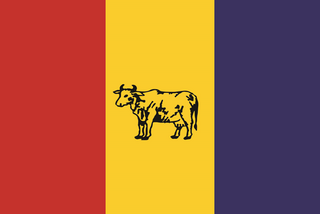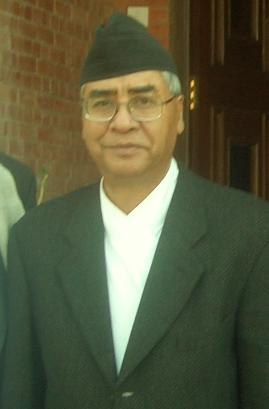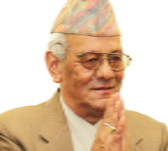
The politics of Nepal functions within the framework of a parliamentary republic with a multi-party system. Executive power is exercised by the Prime Minister and their cabinet, while legislative power is vested in the Parliament.

Surya Bahadur Thapa was a Nepali politician and a five-time Prime Minister of Nepal. He served under three different kings in a political career lasting more than 50 years.

The Nepali Congress is the oldest democratic socialist political party in Nepal and the largest party in the country. The party has 870,106 members as of the party's 14th general convention in December 2021 making them the largest party by membership in Nepal. In June 2023, the party started online membership since the emergence of youth leaders in vital post to bring youths into the party. The party is led by former prime minister, Sher Bahadur Deuba since the party's thirteenth general convention in 2016. The party won 89 seats in the 2022 general election and is currently the largest parliamentary group in the House of Representatives.

The Rastriya Prajatantra Party is a constitutional monarchist and Hindu nationalist political party in Nepal.

Rashtriya Prajatantra Party-Chand was a Nepalese political party. It was a right-wing pro-monarchy party, formed out of the political elite of the erstwhile Panchayat system.

The prime minister of Nepal is the head of government of Nepal. Together with their Council of Ministers, the prime minister exercises executive power in the country. The prime minister must enjoy the confidence in the Pratinidhi Sabha before being appointed by the president and shall resign if they are unable to retain the majority in the House.
The fourth Chand cabinet was formed on 11 October 2002 after Lokendra Bahadur Chand was appointed as prime minister by King Gyanendra, The cabinet only had representatives from two political parties of the dissolved House of Representatives. The cabinet was expanded on 18 November 2002. The cabinet was reshuffled in 11 April 2003.

Kamal Thapa is a Nepalese politician belonging to Rastriya Prajatantra Party Nepal.
Thapa Kaji is a large social group of people of Jharra/Pure Chhettri caste in Nepal. Thapas of Uttrakhand And Himanchal State of India are considered as Pahari Rajput. Over a period of time, this community has spread to many parts of the world. The surname originated during the Khas Kingdom in Karnali region during middle age-it referred to a position/post of a warrior. Chhetri is considered a derivative form of the Sanskrit word Kshatriya.

On 7 June 2017, Sher Bahadur Deuba got elected as the new Prime Minister of Nepal and therefore formed the new Governmental Cabinet of Nepal Deuba's candidacy was supported by the Rastriya Prajatantra Party Nepal, the Rastriya Janata Party Nepal, the Nepal Loktantrik Forum, the Federal Socialist Forum, Nepal and several small parties represented in the Nepalese Parliament after a power-sharing deal with the Communist Party of Nepal, who also supported Deuba's candidacy. After being sworn in, Deuba formed a new government in a coalition with the parties that supported his election. On 17 October 2017, in preparation for the Nepalese legislative election, the Communist Party of Nepal decided to cooperate with the Communist Party of Nepal. For this, all of their ministers left the cabinet after Prime Minister Deuba was prepared to dismiss them.

The Minister of Finance(or simply, the FinanceMinister, is the head of the Ministry of Finance of the Government of Nepal. One of the senior-most officers in the Federal Cabinet, the finance minister is responsible for the fiscal policy of the government. A key duty of the Finance Minister is to present the annual federal budget in Parliament, detailing the government's plan for taxation and spending in the coming financial year. Through the Budget, the finance minister also outlines allocations to all the ministries and departments. The Minister is assisted by the Minister of State for Finance and the junior Deputy Minister of Finance.

General elections were held in Nepal on 20 November 2022 to elect the 275 members of the House of Representatives. There were two ballots in the election; one to elect 165 members from single-member constituencies via FPTP, and the other to elect the remaining 110 members from a single nation-wide constituency via party-list proportional representation.
The first Girija Prasad Koirala cabinet was formed on 26 May 1991 when Girija Prasad Koirala was appointed as prime minister by King Birendra following the 1991 election. The council of ministers was recommended by Koirala and were appointed on 29 May 1991. The cabinet was expanded with the appointment of two state ministers on 5 May 1991.

The first Sher Bahadur Deuba cabinet was formed on 12 September 1995. After Man Mohan Adhikari lost support in the House of Representatives, he recommended to dissolve the lower house. However, the Supreme Court restored the lower house and King Birendra appointed Nepali Congress parliamentary party leader Sher Bahadur Deuba as prime minister on 11 September 1995. He was supported by the Rastriya Prajatantra Party and Nepal Sadbhawana Party.

The Chand–Gautam coalition was formed on 12 March 1997, after the biggest party in the House of Representatives, CPN (UML) supported Rastriya Prajatantra Party leader Lokendra Bahadur Chand as the prime minister. The cabinet was expanded on 25 March 1997, 30 June 1997 and 29 August 1997.
The second Girija Prasad Koirala cabinet was formed on 15 April 1998 after the appointment of Nepali Congress leader Girija Prasad Koirala as prime minister by King Birendra. Girja was supported by CPN (Marxist–Leninist). The cabinet was expanded on 21 April 1998. On 26 August 1998, the cabinet was reshuffled and ministers from CPN (Marxist–Leninist) where included. After CPN (Marxist–Leninist) withdrew their support for the government on 11 December 1998, Girija resigned as prime minister ten days later.

The Krishna Prasad Bhattarai cabinet was formed on 31 May 1999 after Nepali Congress leader Krishna Prasad Bhattarai was appointed as the prime minister by King Birendra following the 1999 election. The cabinet was reshuffled on 30 June 1999.
The fourth Girija Prasad Koirala cabinet was formed on 21 March 2000 after Nepali Congress leader Girija Prasad Koirala was appointed as the prime minister by King Birendra. After the His Majesty's Government Regulations 2000 came into effect on 18 April 2000, the cabinet was reformed. The cabinet was reshuffled on 7 February 2001.











